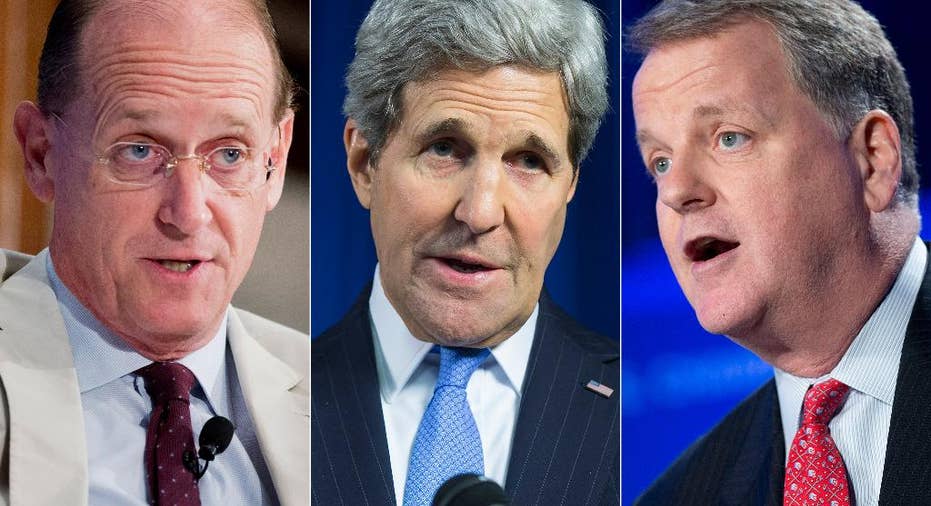American, Delta CEOs try to convince Kerry that Middle East airlines are unfair competitors

The CEOs of American Airlines and Delta Air Lines met with Secretary of State John Kerry as they stepped up their fight against what they say is unfair competition from the three biggest Middle East airlines.
It remains unclear, however, whether the Obama administration will accept the CEOs' argument that the Middle East carriers are heavily subsidized by their governments. The U.S. airlines first lodged their complaints early this year.
American Airlines CEO Doug Parker and Delta CEO Richard Anderson met with Kerry in Washington on Thursday. The State Department said Kerry indicated that the administration is still reviewing the CEOs' complaints.
Kerry is meeting the foreign minister of the United Arab Emirates, one of the governments accused of unfairly subsidizing Gulf airlines, this weekend in London. State Department spokesman John Kirby said he didn't know whether Kerry would raise the airline issue. Kerry and the foreign minister are close friends who sometimes meet socially.
American and Delta declined to make their CEOs available for comment.
Here's an overview of the dispute:
Q: Why are U.S. airlines upset?
A: American, Delta and United Airlines claim that Emirates, Etihad Airways and Qatar Airways have received more than $40 billion in subsidies from their governments since 2004, helping them keep costs and fares artificially low. They say subsidies range from loans that never need to be repaid to breaks on airport fees.
Q: What do American, Delta and United want the U.S. government to do about it?
A: They are asking the administration to renegotiate aviation treaties with Qatar and the United Arab Emirates, and to freeze new routes to the U.S. by Emirates, Etihad and Qatar. They are supported by unions, who fear that expansion by the Gulf carriers threatens jobs of U.S. pilots.
Q: Do all U.S. airlines favor restrictions on the Gulf carriers?
A: No. JetBlue Airways doesn't — it has partnerships with the Middle East airlines to bring passengers into the U.S., where they can connect to JetBlue flights — and neither does Hawaiian Airlines. Package-delivery giant FedEx worries that if the U.S. takes action against the Middle East carriers, it could lead other countries to retaliate with steps to limit its operations overseas. Some travel groups say restrictions on the Gulf carriers would hurt consumers.
Q: What do the Middle East airlines say?
A: They argue that the U.S. airlines are just trying to kill competition so they can continue to charge high fares for international flights. They also point out that U.S. airlines received a government bailout after the 2001 terror attacks and can take advantage of provisions in the bankruptcy laws to shed costs.
Some of the U.S. airlines' partners are or were government-owned, just like Emirates, Etihad and Qatar. The question of unfair subsidies may come down to whether a regular investor would make the same investments that their government owners did.
Q: Do American, Delta and United compete directly with the Middle East carriers on many routes?
A: In many cases, the Middle East carriers compete against the European and Asian partners of the U.S. airlines. For example, an American looking to fly to Chennai, India, could take United to Frankfurt and connect on United partner Lufthansa to India. American, Delta and United say that after Emirates began service to four U.S. cities, bookings on U.S. airlines and their partners fell 21 percent in Seattle, 14 percent in Washington, 11 percent in Boston, and 8 percent in Dallas.
The Gulf carriers have announced new flights this year that would increase their passenger-carrying capacity to the U.S. by 25 percent.
"The problem is getting worse," said Jill Zuckman, a spokeswoman for the big U.S. airlines. "All the facts are in, and we are looking for speedy action to resolve this threat to American jobs and the U.S. aviation industry."
Q: How important is international flying to the U.S. airlines?
A: Very. International flights accounted for one-third of revenue at American, Delta and United in April, May and June. The U.S. airlines are dealing with a mature domestic market where growth is limited, so they are looking overseas for profitable flying. The Gulf carriers have tiny domestic populations. They aim to use their central location and huge fleets to connect the U.S. and Europe with fast-growing markets in Asia.
Q: What has the U.S. government done so far?
A: The Obama administration asked for public comments and got about 5,500 responses. According to the big U.S. carriers, about three-fourths of the comments supported their position that the government should reopen so-called Open Skies talks with Qatar and the United Arab Emirates.
There is no deadline for the administration to pursue those talks or close the case without taking action.
__
Follow Scott Mayerowitz at http://twitter.com/GlobeTrotScott and David Koenig at http://twitter.com/airlinewriter .



















